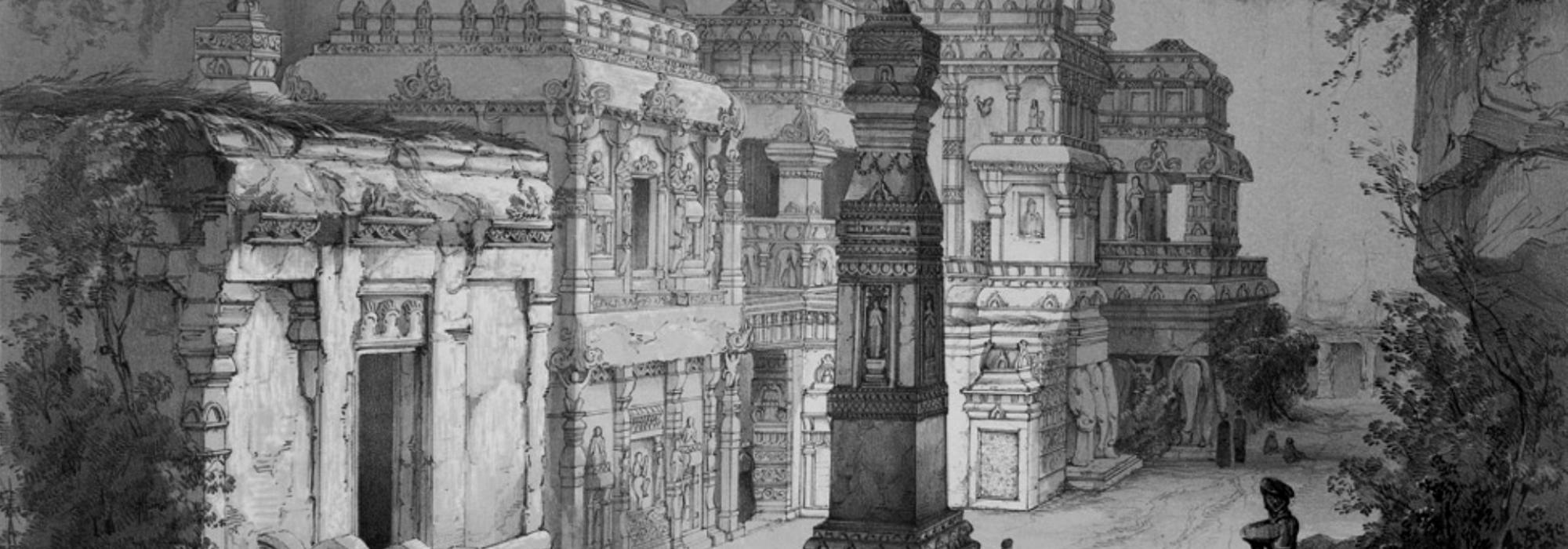2
We have stated that the realisation of value is preceded by a definite awareness of it. This constitutes a very important difference between man and the lower animals which also, as we know, pursue ends like him. They too strive to satisfy their desires, but they differ from him in that they do so without any idea of the satisfaction they are seeking. In other words, they have no idea of the past or the future, as such, and seem to be guided in their behaviour by mere instinct. As the Aitareya Aranyaka says: ‘Among living beings, it is man alone that says what he has known, that sees what he has known. He knows the future, he knows this world and the next; and he desires to attain the immortal through the mortal. Thus is he endowed, while other creatures are aware of only hunger and thirst [1]. It means that, while an animal, generally speaking, has no world other than the one given at the moment which is the world of its immediate practical interest, man can not only transcend it in thought but can also conceive of an ideal world which is fixed and independent of it. In this feature of man’s activities, that they are consciously directed to an end, we find the criterion of 'human values'. They are values in the fullest meaning of the term; and we propose to confine our attention in what follows to them, which are described in Sanskrit as purusharthas or ‘what are desired by man.’[2]
That the pursuit of purusharthas presupposes a knowledge of them does not, however, mean that man does not seek values unconsciously [3]. In so far as he is one with the rest of animal creation, he certainly does so. But these ends, as in the case of lower animals, are chiefly such as help the maintenance of the individual and the continuance of the species, or, as they are otherwise stated, self-preservation and race-conservation[4]. The Hitopadesha says: ‘Hunger, sleep, fear and sex are common to man and beasts. It is jnana that specially characterises man; and when they lack it, they become one with the beasts’.[5] It should not therefore be concluded from what was stated above that whenever man sets about the satisfaction of his needs, he necessarily knows beforehand that he is doing so. A child has no idea of its need for food, but yet it seeks satisfaction from its mother's breast. The presupposition of knowledge is only the distinguishing mark of values sought by man, as such, and it is they that are to be understood by the term purushartha.
To be able to pursue his ends, with a previous knowledge of them, means that man is not merely aware of the object he seeks (and in search of) but also of himself as aware of it. That is, the self which appears as a knower in the one case becomes itself known in the other. Even when man is engrossed in an external object, he may not be unaware of himself; but the point is that he is not then explicitly conscious of himself. This capacity to know one's self or self-consciousness is a great gift, because man can thereby become the spectator of himself, able to review his thoughts, feelings and actions as if they were apart from himself and pass judgments of approbation or disapprobation upon them. Such self-criticism necessarily points to the awareness of a standard by which he judges; and the standard can be nothing short of absolute perfection, for the reason that the need for criticism will continue to be felt until an ideal, which is free from all imperfections and is therefore completely satisfying, is reached. This is, as already pointed out, what the Aitareya Upaniṣad means when it says, in the passage just quoted, that 'man desires to attain the immortal through the mortal'. In fact, man would not feel that he was imperfect, if he had not within him such an ideal, latent though it may be. Whether he will ever attain it or whether it marks only a limiting concept or norm which is never actually attained, is a question to which we shall advert later. For the present, it will suffice to note the existence in his mind of this ultimate ideal, ever urging him to strive for reaching it.
It is the presence within him of this idea of perfection that makes man a spiritual being. But the awareness of it does not necessarily mean that he will consistently work for its realisation. In other words, the capacity for self-criticism is not the same as the capacity for self-determination. The reason for his failure to respond to this inner call is that he is also a natural being, in that he is urged by the lower impulses which he has inherited from the past. That is, he is not only inspired by a consciousness of what he ought to be; he is also what he is, which tends to keep him bound to the pursuit of inferior ends. He has ‘a footing in nature as well as a winging in the sky’. This double character usually results in an internal conflict between the flesh and the spirit or, as they are otherwise termed, the lower and the higher selves. There seems to be a lesion, as it were, between the two selves so that the promptings of the higher self have no practical influence on the lower, if man does not seriously and wholeheartedly will to 'erect himself above himself'. This is what the Gita[6] means when it describes that man is his own friend or his own foe, according as he chooses to live. In other words, man is the master of his fate, and he has the freedom to rise or to fall. One fortunate circumstance, however, is that man's higher nature does not allow itself to be either ignored or suppressed, unless he has once for all sunk back into the life of the mere animal, destroying his proper humanity. The imperative to the higher life is always there within him, and he cannot be at peace with himself, until he finally makes up his mind to obey it, overcoming all adverse influences.
From this conflict between consciousness of the ideal and disinclination to follow it, emerges the notion of 'right' or the morally good, which is one of the higher values of life[7]. That is right, we may say provisionally which furthers and does not thwart the pursuit of the highest end of life; and any deviation from it is wrong on the principle that 'we needs must love the highest when we see it'. It means that there is a normative relation between the final good and a self-conscious agent, in virtue of which he feels that he ought always to act in such a manner as to approach it more and more. An ideal signifies an obligation to work for it; and, if any person disregards it, it only means that his natural impulses have the upper hand. Where they are so, man's capacity for self- consciousness, instead of making for the betterment of his inner nature may lead to a result which is the very reverse of it. The satisfaction which an animal seeks is limited to the present moment, for it has not the power to look before and after. Man possesses such power; but, as he can consciously organise his interests and devise appropriate means to satisfy them, this power may, by aiding the gratification of his animal appetites, lead him to deliberate self-indulgence. Considered in themselves, natural appetites are not bad, for they are without any moral significance. But in self-conscious man, if he knowingly sets about their indiscriminate gratification, they lose their moral neutrality. So far from contributing to his elevation, his capacity to know his ends beforehand may thus become a defect, dragging him down even from the animal level. Knowledge, instead of being an influence for good to himself as well as to others, thus becomes in his case an influence for evil.
The notion of right thus points to the direction in which man ought to endeavour. But direction necessarily implies a goal; and a knowledge of that goal is essential, if man should strive for it. It is true, we said, that he is already aware of the ideal[8], viz. self-perfection; but this awareness is quite vague and, unless it becomes clear and convincing by a thorough grasp of the distinction between the lower and the higher selves, it will not influence practical conduct. Lack of such knowledge, is the reason why, in practice, consciousness of higher values is mostly inoperative in the case of a person who loves and clings to his lower self. If thus the pursuit of the ultimate end depends upon a clarification of the nature of the higher self, man must first have a correct conception of it. That is how philosophy has come to be regarded in India as essentially 'the science of self' (अध्यात्म-शास्त्र)[9]. It is in determining the true nature of the self and its relation to the other selves as well as to its physical environment, viz. the world of nature that the idea of 'truth', another of the higher values, arises.
The right and the true are the two higher values that emerge in the course of man's efforts to reach the final ideal of life, viz. self-perfection. But the pursuit of the higher ends does not mean the abandonment of the lower ones. He need not despise the latter before he can follow the former. It is a common saying among the Indians that the lotus lives and grows in the watery mire and finds no need to abandon it to keep itself pure. Some of these values, like food and drink which are needed for preserving life and are therefore described as survival values, form the very basis of all activity[10]; and their pursuit is necessary as a precondition to the pursuit of the higher ends. There are others, like wealth, which are not indispensable for it in the same sense. But even they are not to be necessarily abjured. Only the primacy of the ideal ought never to be forgotten in their pursuit.[11] They may be sought as means to the attainment of some higher end, when their character will become totally transformed. There is a world of difference, for example, between wealth sought as a means to self-indulgence and as a means to some beneficent purpose'. In any case, their pursuit should not come into conflict with that of the higher ends. There may be a difference of opinion as regards the extent to which their pursuit is legitimate; but they are not, as such, incompatible with the achievement of the true values of life.
Footnotes
1 Aitareya Aranyaka 2.3.2
2 Whether objects below the level of conscious being also seek values is a difficult question to decide. Some among modern as well as ancient writers have said that they do. A recent writer, Prof. Laird, for example, remarks that even such objects exhibit a partiality or 'non-indifference', as he terms it, to some things as distinguished from others. A creeper twines round a tree near by, and iron filings move towards the magnet, implying by their behaviour a certain preference to one object rather than to another (Idea of Value, Ch. III). And among ancient writers, Manu, for example, has stated that plants and trees have a sense of pain and pleasure (1.49). But it is not necessary for us to settle this question, since we confine our attention here to 'human values', described as purushartha—a term which signifies that they are for a reflecting subject and thus excludes all reference not only to the sphere of infra-conscious being but also to all lower animals.
3 See Vakyartha-ratnam of Ahobala Suri (Mysore Oriental Library Edition), 1.48-9. Cf. Dinakariya on Siddhanta Muktavali (Nirnaya Sagar Press, 1916) p. 468.
4 Both of these may be brought under kama, which, as we shall soon see is one of the two empirical values recognised by Indians. Some animals seem to be aware of the other empirical value of artha also, for they are seen to amass food for future use. Robert Burns in one of his well-known poems speaks of finding ears of corn hoarded in the 'nest' of a mouse when it was turned up by a plough.
5 आहार-निद्रा-भय-मैथुनं च सामान्यम् एतद् पशुभिर् नराणां ज्ञानं हि तेषाम् अधिको विशेषः ज्ञानेन हिनः पशवो भवन्ति. Jnana here stands for 'reflective consciousness'. Dharma is a variant reading, which implies the same capacity. See also Yogasutra Bhasya (Anandashrama Series) 2.9 and Bhartrhari: Shataka 3.18.
6 आत्मैव ह्यात्मनो बन्धुः आत्मैव रिपुरात्मनः 6.5. See also st. 6.
7 य एव श्रेयस्करः स एव धर्म-शब्देन उच्यते (Shabara on Jaimini Sutra, 1.1.2). Cf. Brentano: 'We call something good when the love relating to it is right'.
8 The words ‘value’ and ‘ideal’ are often used as synonyms, but there seems to be an important difference between them. Ideals are mere constructions of the mind and they may not be necessarily achievable; values, on the other hand, express an actual relationship to the purpose of the person thinking of them. It is this emphasis on will in the case of value that distinguishes it from an ideal.
9 Cf. the name of Shariraka-mimamsa or investigation (i.e. primarily) of the nature of the embodied self given to Vedanta. Cf. Shankara’s commentary on Vedanta Sutra 1.1.1.
10 Cf. Kumara-sambhava, 5.23: शरीरम् आद्यं खलु धर्मसाधनम्.
11 Cf. अन्तेषु रेमिरे धीराः न ते मध्येषु रेमिरे, a saying which occurs more than once in the Mahabharata (see e.g. 5.90.97) and is usually explained with reference to the order in which the four purusharthas are mentioned in the phrase धर्मार्थ-काम-मोक्ष.















































